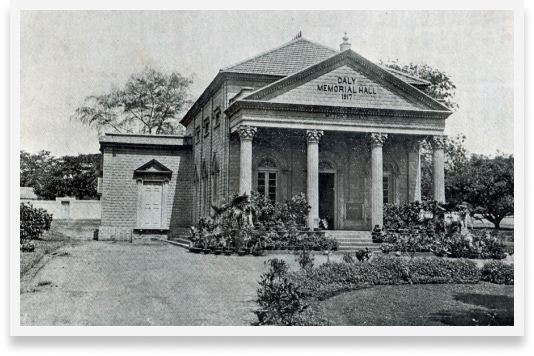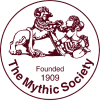Research
M.H. Krishna Institute of Indology
General Information
M.H. Krishna Institute of Indology was a Post-Graduate teaching and Research Institution. Founded in 1999it was a leading institution in Bangalore in conducting several teaching and research programmes in Indian studies. The Institute was recognized by the Govt. of Karnataka and affiliated to the Bangalore University.

Background and Objectives:
Encouraged by its increasing popularity in Bangalore, the
society felt that it needs to expand its activities by starting a teaching cum research institution in Indology, a facility which was lacking in this city. There was a more pertinent reason too from the academic point of view. Though India has continued to be a single organic cultural entity for the last five thousand years or so, several developments in the field of historical
studies has resulted in vitiating the field with compartmentalized perspectives and partisan overtones ignoring India’s unity and cultural continuity. The Mythic Society felt that there is need for an academic institution devoted to promote Indian studies as a unitary entity, cutting across arbitrary
chronological divisions and perceiving all aspects of Indian society and culture throughout the ages as part and parcel of a larger systemic continuum.
The Institute was named after Professor M.H. Krishna (1892-1947), who was indeed an Indologist in the full sense of the term. He was the Director of Archaeology in the erstwhile princely state of Mysore and a Professor of History in the University of Mysore. His varied contributions range from conducting archaeological excavations in prehistoric sites, through publications on epigraphy, numismatics, and architectural and sculptural studies from the earliest to the modem period, to studies on Tipu Sultan and 18th and 19th century. archival material. The Mythic Society celebrated his birth centenary in 1991, and it is at that time the idea of the Institute of Indology was conceived.
Functions and Projections:
The M. H. Krishna Institute was set up specially for the cause of generation and dissemination of knowledge in the field of Indology. The Institute desires to accomplish this, by emerging itself within a few years as a centre of excellence conducting high level research and advanced teaching. It is planning to start a Master’s Degree course in Indology and enroll students for M.Phil. and Ph.D. degrees. Other activities include organizing short term courses on Indological themes and helping distance learning by preparing material for the electronic media, undertaking research projects, sponsoring lectures, seminars and workshops and bringing out scholarly and popular monographs. Though these are normal functions of an academic organization, the M. H. Krishna Institute of Indology wants to conduct these with some difference. The first is its stress on maintaining quality and excellence. The second is to come out of the colonial concept of Indology and expand its scope from its usually understood content of Sanskritic studies, ancient Indian religion, philosophy, art, literature and culture.
Indology here would now mean a holistic study of Indian civilization from prehistoric times to the present day. This would include, besides the traditional subjects, dimensions of anthropology, society, economy and politics, law and legal institutions, science and technology, health and hygiene, regional cultures, trans-regional and trans-national contacts, as well as comparative studies with other civilizations. The objective is to develop a better understanding of the dynamics and significance of the-Indian civilization as it happens to be one of the few enduring experiments in the long civilization process of mankind.

Present Research Initiatives and Projects:
History and Culture of Bharata in a series of several volumes, based on latest Archaeological evidences, prehistoric and historical are coming to light enormously.
Tumakuru Jilleya Devalay Kosha, This project is in association with Department of History and Archaeology, Tumkur University. This project is headed under Dr. M. Kotresh, HoD, Department of History and Archaeology, Tumkur University. All the 10 taluks of Tumakuru district will be surveyed, documented for ancient temples and historically important places and this documented information will be corroborated and complied with other published sources.
Past Research Programs:
Barakur Archaeological Excavation Project
Barakur, now a small town on the west coast of Karnataka, was once a flourishing city. It was a provincial capital for the region, an industrial centre and a commercial town with a sea port carrying on-trade with countries beyond the Arabian Sea. This site which was awaiting systematic probing for long has the potential to open up fresh lines of enquiry in the study of Urban Archaeology. The Institute took up preliminary excavations here in collaboration with the Archaeological Survey of India in February-May 2003. So far it has yielded significant information on this provincial capital of the Vijayanagara period. The excavations were conducted under-the direction of Dr. S. Nagaraju, Dr. B. Narasimhaiah and Dr. S.V.P. Halakatti.
Research Project on Kumbha Mela at Ujjain April-May, 2004
In collaboration with the Indira Gandhi Rashtriya Manav Sangrahalaya (Museum of Mankind), Bhopal, the Institute carried out a project of documenting the Kumbha Mela celebrations held at Ujjain during April-May 2004. The documentation of this unique twelve yearly event, wherein pontiffs and followers of various religious denominations and different orders of sanyasis gather, can be considered as the first step for the Institute’s long term programme of preparation of monographs on Hindu religious sects and traditions. This Kumbha Mela was spectacular with nearly 30 million people taking part in it. Our research team interviewed several sabhapatis, mahamandaleshwaras, mahants and other functionaries of the famous akhadas (ascetic organizations), as well as individual recluses and lay devotees. Various religious practices like those of the Aghori sanyasis, different methods of yoga practice like titiksha (endurance development by exposing oneself to sun or cold for hours) and panchagnisadhana (performing penance sitting amidst fire on four sides and above), a yajna (fire sacrifice) and the famous holy dips (Shahi-snans) in the river Kshipra were extensively videographed, This research project is a novel experiment in contemporary anthropological research. The material gathered is being processed for preparing monographs and documentary films.

Documentation of Maha-Nadavali at Dharmasthala::
Maha-Nadavali celebrations held in Dharmasthala (2005), after a lapse of 53 years, was completely documented audio-visually by our Research unit. As the Nadavali represents a religious practice associated with Bhoota worship, but held intermittently, a complete recording helps systematic analysis of this unique survival from the past. This project is an important step to open new areas in the study of anthropology of religion. The analysis so far done indicates that here we have a glimpse perhaps of a primordial stage in the evolution of religious thought in conserving the nature of supernatural forces and ways to propitiate them.
Team:
Dr. Jayasimha – Senior Research Associate
Dr. Vithal D Potdar -Senior Research Associate
Sri. Ganesh – Research Assistant







